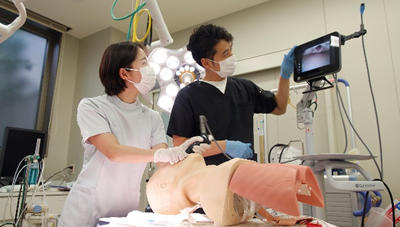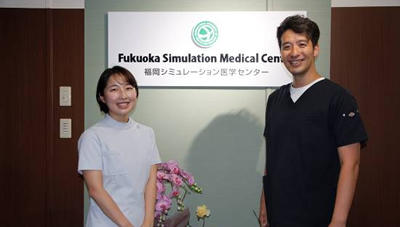School of Medicine at Narita
Faculty of Medicine
Clinical Clerkship Reports 2021

Supervisor report: Takagi Hospital, ER, Vice Manager, Shiki Nakayama
What do you expect student to do and to understand during the clinical clerkship?
I want students to understand “What is clinical training all about? In the first place. In clinical training, it is important to be in contact with patients and to experience clinical practice first-hand. I expect students to be willing to experience and try as many things as possible.
What did you feel our medical students were unique compared to medical students from other universities?
As a newly established medical school, I think there are not so many traditional styles. I think that students have been creating their own styles. Also, they seem to have a mixture of different ways of thinking since School of Medicine has 20 international students in each grade.
Were there any occasions in which you felt that students were able to make use of what they had learned about medicine in English?
Basically, it seems students do not have much difficulty with medical English, and I often see them looking up English articles in literature searches. I think it is the result of education in English.
How were the international students?
I am surprised by their strong motivation for learning medicine in Japan.
What would you like to say to exam candidates?
The School of Medicine, International University of Health and Welfare, is different in every way from existing medical schools in Japan. We are the only medical school in Japan that has students of various nationalities. Furthermore, students have been creating their own style since it is a new medical school.

Student report: Miu Takeuchi
How did you decide on which hospital and department to practice in?
I am from Tokyo, but I chose Kyushu. Because I wanted to spend six months in a place I had never been before. I wanted to practice at Takagi Hospital because I heard from my seniors that it is easy to ask questions to doctors because there are only one or two students per department, and also I can practice techniques if I want to.
What does a day in clinical clerkship look like?
The day starts with ward rounds, while the internal medicine department observes outpatient clinics and examinations, and interviews the patients. For surgery, the main part of the day is spent observing operations and participating in pre- and post-operative conferences. After the lecture, there is a time for information sharing between the three areas, which also allows us to get to know what is happening in each hospital.
Was there any particular occasion when you felt the achievement of your three years of study?
When I gave a presentation of a case in obstetrics and gynecology, I referred to an article in English and was praised by my supervisors. I think that my experience of discussing in English made me less resistance to referring to literature in English.
Were there any occasions when you felt the achievement of the integrated clinical teaching?
I was able to learn about the pathophysiology of the disease and the mechanism of action of the therapeutic agent at the same time was very useful for clinical practice.
Did you find any differences between what you learned at university and what you do in the field?
I used to have a vague idea that patient care was about diagnosing the symptom, performing the necessary tests and formulating a treatment plan. However, I learned that in actual practice, it is very important to collect information about the patient's life and social background, and to build a trusting relationship through close communication.
What is the most memorable experience you have had with a patient?
I was in charge of a six-year-old boy in the pediatric department. It reminded me of the time when I was 10 years old and an intern and a doctor visited my room every day to play with me. We made origami together every time we saw each other. On the day he was discharged from the hospital, I went to see him as usual and he thanked me with a smile, offering me a letter and a small origami medal. At the beginning his condition was very difficult, but when I saw him getting better and better, it gave me a lot of strength.
What was your memorable experience with the other medical professions?
I had the opportunity to learn about IVF, artificial insemination and frozen embryo preservation from the culturists who are involved in fertility treatment at Takagi Hospital's Fertility Centre. I learned that the culturists also join societies and study every day to improve their expertise. It was impressive to see how they take pride in their profession and work hard to provide high quality medical care.
Were there any occasions you felt you "grew up" during your clinical clerkship?
At first, I was not very good at interviewing patients and writing medical records. I had practiced in medical interviewing classes, but when I was in front of a patient, my mind went blank. Now I am able to ask questions with being aware of what they are thinking and what they are trying to ask. My medical records are checked by my supervisor and I continue to train myself.
About the environment during the clinical training (location of the hospital, living environment, living conditions, etc.)
There are a supermarket, pharmacy, convenience store and several restaurants within walking distance. I lived in a dormitory about 7 minutes walk from the hospital, which was very convenient as I could make good use of my morning time. Most of us had a lunch in the hospital cafeteria.
What skills do you think you need at the moment?
I want to train myself to be able to think based on evidence. When I look at clinical practice from the perspective that there is a reason for everything you do, there are still many things I don't understand. I would like to continue to ask questions about every single thing and to think about the reasons why I did what I did.
Have you decided which department you would like to pursue through clinical training?
At the moment, I am thinking of going into obstetrics and gynecology. The first time I witnessed a birth, I was really impressed with at how fast the baby came out. I was moved by tears of the patient on the operating table after hearing her baby's voice.



